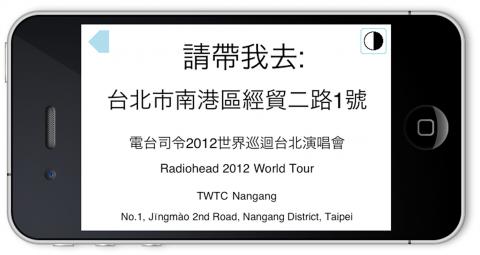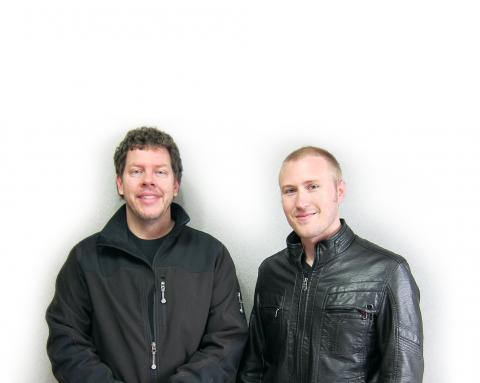Managing the ins and outs of life in a foreign country has its challenges, and in Taiwan, expatriates have long turned to online communities and Web sites to ask and answer questions, exchange tips and information, or simply vent their frustrations.
A fair number of Web sites cater to English-speaking foreigners in Taiwan. The best-known include Forumosa.com, an established Internet forum full of lively discussions on every facet of life in Taiwan, from the practical to the mundane; Tealit.com is another popular site for finding English-teaching jobs and buying and selling used items; Taiwanfun.com and Taiwannights.com focus on leisure and recreation.
And now a new Web site, run by two Taipei expats, aims to cover all of the above.

Photo Courtesy of Taiwanease
Taiwanease.com was launched in September last year by Eric Schmitt and Anthony van Dyck, who are hoping their Web site’s features will make it the new go-to resource for foreigners and visitors to Taiwan.
Van Dyck, a 45-year-old Canadian who has lived in Taiwan since 1989, was one of the co-founders of Forumosa.com, but decided it was time to move onto a new venture.
He and Schmitt, a 27-year-old American software engineer and marine ecology graduate student, saw an opportunity to provide a resource more organized than discussion forums such as Forumosa or Taiwan Ho!, where foreigners post information on everything from the process of opening a bank account to which restaurant serves the best pizza.

Photo Courtesy of Taiwanease
“You could search the forums but you would get an answer that might be 10 years old,” said Schmitt. “Or hidden in 10 pages of static,” added Van Dyck.
As Van Dyck sees it, foreigners “have to now go to 10 different Web sites” to get information. “That doesn’t make sense.”
So the pair set out to make Taiwanease a one-stop “community-sourced resource” with information that is organized, easily searchable and up-to-date.
Part of their solution lies in an online directory with a dozen categories that include hotels, trade offices and embassies and restaurants. Each place has its own dedicated page with address and contact information listed, and space for Web site users to write reviews.
GETTING AROUND
Van Dyck and Schmitt are particularly excited about one feature of their directory, Taxi Cards, which is designed to help travelers or people who don’t speak Mandarin.
For example, a user who searches the site might find Zoca Pizza on Linjiang Street (臨江街) in Taipei and decide to go there. He or she can then click on “print taxi card,” which opens a new page with a map linked directly from Google Maps and simple instructions written in Chinese to show to taxi drivers. The Taxi Card pages are formatted for printing, and are also easy to read when opened on a smartphone’s Web browser.
Although for many people Google is a de facto online directory of sorts, Van Dyck and Schmitt say Taiwanease is different because their information is curated, updated and accurate. The site is run by a small staff that collects and edits data for the directory. They verify the addresses of all places listed in English and Chinese, and collect GPS data to make it searchable using a smartphone or Google Maps. And students of Mandarin will appreciate that all addresses are listed both in Chinese characters and Hanyu Pinyin with tone marks.
USER POWERED
The online community is also important to Taiwanease, says Van Dyck. He says users are encouraged to submit information on their favorite restaurants or whichever places are suited to the site’s given categories. (It’s not apparent on the Web site, though. Users have to scroll to the bottom and click on “submit a venue”).
Anyone holding an event can submit it to be listed on the site. Taiwanese’s main page also has an “upcoming events” column that lists major concerts and events, as well as activities held by members of the foreign community.
Taiwanease also provides practical information for expats living in Taiwan, including a step-by-step guide for foreigners applying for permanent resident status, as well as a guide for getting a motorcycle license. There are also general interest articles on Taiwanese life and culture, which include a recently written opinion piece on the state of Taiwan’s roads and driving standards.
Some long-term expats will recognize a few of these articles as recycled material from a now-defunct magazine, also called Taiwanease, which was published from 2006 to 2007; Van Dyck was one of the co-owners. And as is the case with the magazine, Taiwanease the Web site will feature a mix of how-to guides written by volunteers and articles penned by paid contributors.
Taiwanease has a classified ads section with a different name, Taiwanted, which Van Dyck brought over from his days at Forumosa. Users can post ads for free, though Van Dyck and Schmitt say they are considering charging for job classifieds in the future.
“REAL” PRESENCE
Those accustomed to the online discussion board format of Forumosa will find a similar offering at Taiwanease. (In fact, a number of netizens that frequent Forumosa are also online participants at Taiwanease). There’s also another forum for native Chinese speakers, dubbed Taiwaneasia (台灣易喜亞).
For Van Dyck, another side of the community aspect behind Taiwanease is its “real human presence.” He says that Taiwanease has already started to hold regular social events, and its get-togethers at pubs and restaurants are open to all (meeting times are posted on the site’s forums). The Web site has also pledged a portion of its revenues to the Taiwanese chapter of the Society for the Prevention of Cruelty to Animals (SPCA).
Van Dyck and Schmitt are running Taiwanease as a for-profit business supported by advertising and they hope loyal users and travelers will buy their soon-to-be released iPhone application, which is a cleaner, ad-free version of the Web site.
But they say they aren’t in it for the money.
“Even if we don’t make a dollar off of this, so be it,” said Schmitt. “We didn’t actually set out to get rich. We set out to make life easier.”
“This is also about Taiwan being a really good place to work, a good place to live, and a good place to visit,” said Van Dyck. “So I really want to promote that.
Taiwanease will be holding an official launch party in May. Details will be announced at its Web site.
Taiwanease for smartphones
An iPhone app, which will cost NT$95 (US$2.99) and is advertisement free, offers quick access to all of Taiwanease’s services. Planned launch is next month Apps for Android and Windows Phone 7 are also in the works. Check Taiwanease.com for the latest news

Three big changes have transformed the landscape of Taiwan’s local patronage factions: Increasing Democratic Progressive Party (DPP) involvement, rising new factions and the Chinese Nationalist Party’s (KMT) significantly weakened control. GREEN FACTIONS It is said that “south of the Zhuoshui River (濁水溪), there is no blue-green divide,” meaning that from Yunlin County south there is no difference between KMT and DPP politicians. This is not always true, but there is more than a grain of truth to it. Traditionally, DPP factions are viewed as national entities, with their primary function to secure plum positions in the party and government. This is not unusual

Mongolian influencer Anudari Daarya looks effortlessly glamorous and carefree in her social media posts — but the classically trained pianist’s road to acceptance as a transgender artist has been anything but easy. She is one of a growing number of Mongolian LGBTQ youth challenging stereotypes and fighting for acceptance through media representation in the socially conservative country. LGBTQ Mongolians often hide their identities from their employers and colleagues for fear of discrimination, with a survey by the non-profit LGBT Centre Mongolia showing that only 20 percent of people felt comfortable coming out at work. Daarya, 25, said she has faced discrimination since she

More than 75 years after the publication of Nineteen Eighty-Four, the Orwellian phrase “Big Brother is watching you” has become so familiar to most of the Taiwanese public that even those who haven’t read the novel recognize it. That phrase has now been given a new look by amateur translator Tsiu Ing-sing (周盈成), who recently completed the first full Taiwanese translation of George Orwell’s dystopian classic. Tsiu — who completed the nearly 160,000-word project in his spare time over four years — said his goal was to “prove it possible” that foreign literature could be rendered in Taiwanese. The translation is part of

April 21 to April 27 Hsieh Er’s (謝娥) political fortunes were rising fast after she got out of jail and joined the Chinese Nationalist Party (KMT) in December 1945. Not only did she hold key positions in various committees, she was elected the only woman on the Taipei City Council and headed to Nanjing in 1946 as the sole Taiwanese female representative to the National Constituent Assembly. With the support of first lady Soong May-ling (宋美齡), she started the Taipei Women’s Association and Taiwan Provincial Women’s Association, where she